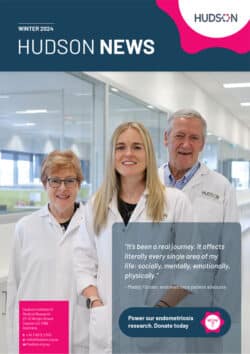Professor Robert McLachlan AM, NHMRC Principal Research Fellow
Male fertility issues are responsible for half of all cases of infertility and assisted reproductive treatment (ART). However, the underlying cause is usually not known. I investigate the origin and development of male infertility with the goal of identifying targeted treatments to alleviate the huge personal and societal burden.

Areas of interest
Research group
Biography
Prof McLachlan is a male reproductive health physician and scientist. He specialises in basic and clinical research in male reproductive health with a focus on male infertility, the genetics of male fertility, spermatogenesis, and the action and use of androgens.
He is a Consultant Endocrinologist at Monash Medical Centre, Consultant Andrologist to the Monash IVF program, and a leading advocate for men’s health on a national stage.
Prof McLachlan has made significant discoveries related to male reproductive health, its translation into clinical practice and education for both clinicians and the community. His focus has been on the recognition of male partner infertility and driving systemic improvements in clinical care, data collection, targeted research, reproductive outcomes and the quality of information provided to infertile couples.
Prof McLachlan has pursued long-term studies of infertile men and the health of their offspring conceived through Assisted Reproductive Treatment (ART). This research has improved the quality of information provided to infertile couples and seeks to optimise clinical care and reproductive outcomes.
Prof McLachlan’s research impact includes
Male infertility | Advances in Australian clinical practice including evaluation within ART units, the establishment of Australia-wide data recording of male aetiology and ART outcomes, and educational resources for the community and profession.
Spermatogenesis | Identifying the hormonal requirements of spermatogenesis and clinical studies of hormonal contraception to demonstrate efficacy.
Androgen | Conducting clinical trials in obese and older men with outcomes including anthropometry, cardiovascular and diabetes risk, sexual function, and quality of life
His research program has been supported by continuous NHMRC funding for the since 1990, as well as other peer reviewed and industry-funded sources. In 2020 he was awarded a $4.5M MRFF grant.
Prof MacLachlan has received several awards for his clinical research and was appointed a Member of the Order of Australia (AM) in 2016 for services to medicine in the field of endocrinology. Over his career, Prof MacLachlan has been instrumental in educating doctors and the community about male reproductive health, particularly to normalise discussion of sensitive topics and encourage men to seek help. As the Medical Director of Healthy Male – a Federal Government initiative in male reproductive health – he provides evidence-based resources for the community and clinician training, in addition to advocacy to Government and collaborative programs in the men’s health sector.
Education

Awards and fellowships

Affiliations

Publication highlights


